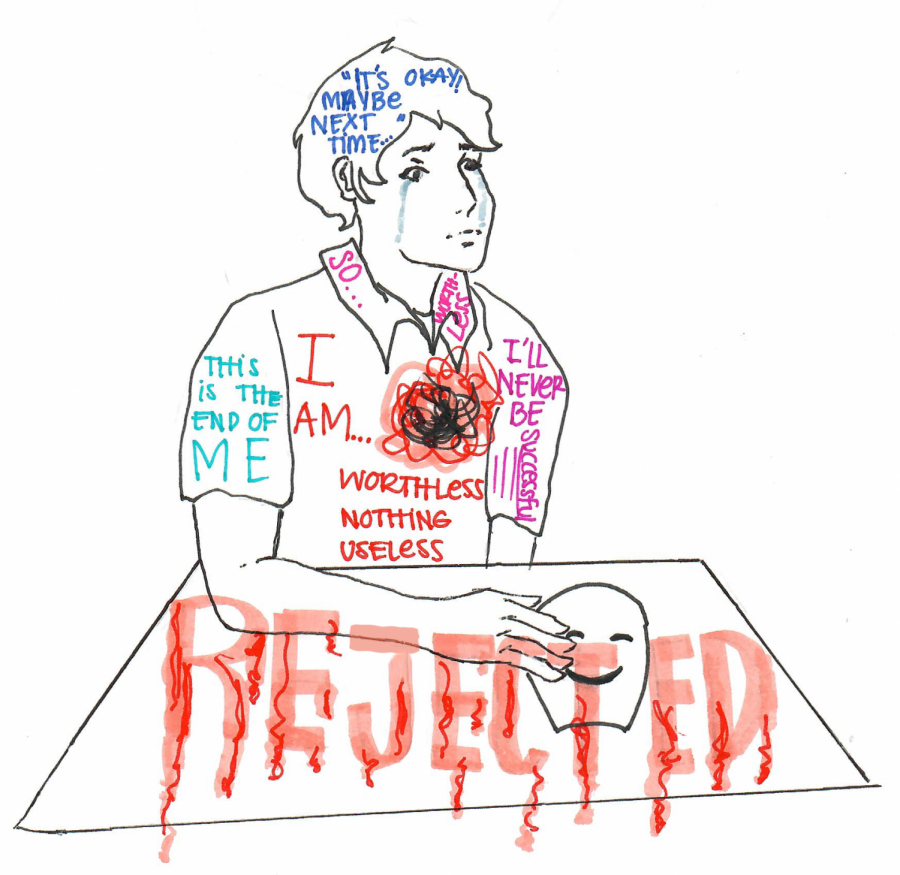How to Get Over College Rejections
April 28, 2019
College acceptance season has just passed. All your friends were getting acceptance letters from various colleges and buying college merch and you received an email from your dream school that starts with “I am sorry to inform you that…” What do you do now?
1. Acknowledge how you feel.
It’s okay to withdraw from schoolwork to gather your thoughts and feelings for a few days. Feeling sad, angry and distraught is perfectly normal. It is important to acknowledge how you feel; talk to someone and express yourself aloud. Accepting your feelings is the first step to moving on from a college rejection, especially if it was your dream school.
“It wasn’t easy getting over the shock, but one way I ‘got over it’ was talking it out with just close friends and family,” said senior Leslie Abrenica.
2. Remember who you are.
Whether you do or do not get a college acceptance, it does not measure your worth. It does not erase the past four years of your hard work. Nobody and nothing can take away what you have worked for. You are good enough. You are smart enough.
“The reality is that colleges look at everybody differently,” said World Language Magnet counselor Ms. Cynthia Vivar. “It just means that maybe at this time, this college was not a good fit for you.”
3. Where you go does not matter, but what you do there does matter.
Many believe in the “Harvard Effect,” which implies that people who graduate from Harvard or an elite school get more opportunities and a higher salary. But the salary boost from going to a super-selective school as compared to any other school is practically zero, according to economists Stacy Dale and Alan Krueger in a paper published by the Quarterly Journal of Economics. They found that students’ habits and initiative in school will have more effect on their success than the college they went to.
In other words, where you go does not matter. What you decide to do with your education does truly matter. Heavily research the schools you got accepted to or the one you’re going to. What programs do they have that interest you? Do they have clubs that you are interested in? Do any minors interest you? What great things can you do at that school?
“It’s just a location. You can achieve the same things in a different location,” said college counselor Dr. Renysha Scott.
“I think some people forget how many people are applying to colleges,” said STEMM Lead teacher Mr. Brent Rojo. “Especially in a world where people have five different professions in their lifetime, it is perfectly okay to not know what you’re doing and not be on a ‘typical college path.’ I think we should respect seniors who are mature to know that they don’t want to commit to a four-year university.”
4. Accept advice from people who care about you
Here are some wise words from peers and staff:
“Advice for someone trying to get over a college rejection: put down that letter or electronic email,” said senior Johnny Hernandez. “Go hug your dad and kiss your mother on the cheek. Call up a friend and ask how they are. Make plans with your squad to do something fun. Why waste time over a letter when you can use that time to be cheerful?”
“Try to look past it and look at all the acceptances that you have or the community colleges nearby,” said senior Diana Zapata. “It’s not the end of the world even if it’ll seem like it. There are so many opportunities around us to keep pursuing our education.”
“Don’t overthink it, you did great all four years and look for other options,” said senior Salvador Molina. “A couple of rejections won’t do you any wrong; there are other places to go.”
“You are amongst 85% of students that applied, it happens every year,” said Dr. Scott about rejections. “It doesn’t make them less of who they thought they were. It is not a defining moment.”
“My advice to whoever gets rejected from a college is don’t be ashamed of it,” said Abrenica. “It’s okay to fail because failure is part of life, and eventually we’ll learn from it and manifest these failures into a stronger, better version of ourselves.”



